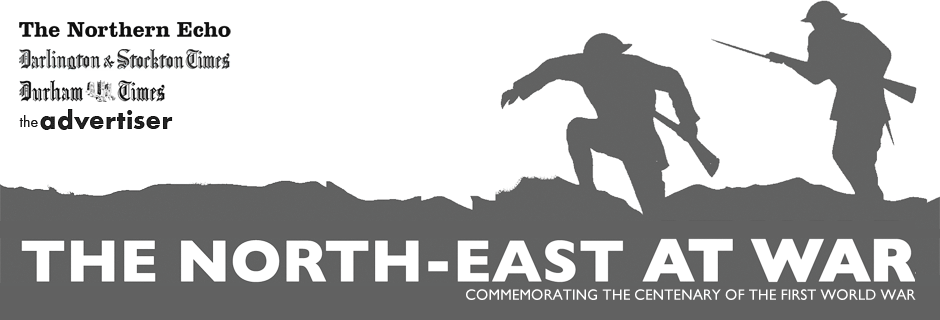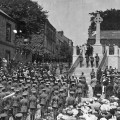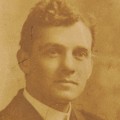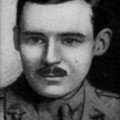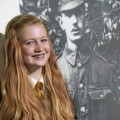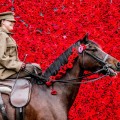Sergeant John Teasdale survived the Great War thanks to ‘a series of miracles’. His ‘vivid narrative’ of his experiences still chills to the bone.
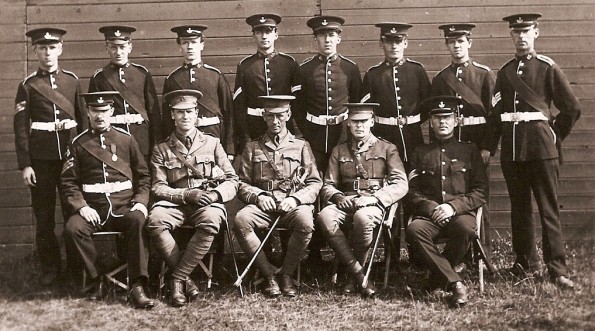
The 8th DLI: Sgt Teasdale is standing on the far right. Picture courtesy of Harry Moses
IN August 1915, the Darlington and Stockton Times published a lengthy account written by Sergeant John George Teasdale, a Darlington teacher, of how his battalion of the Durham Light Infantry had been all but wiped out at Ypres.
He was a member of the 8th Battalion, which included past and present students of Bede College – a teacher training college in Durham. They left their training camp at Gateshead on April 19 and just six short days later were pitched into the Battle of Gravenstafel Ridge. It was an emergency – the British line was in danger of breaking, and even though the 8th was untried, they were all that the commanders had at hand, and so had to be thrown into the breach.
It was a disaster. Of the 102 Bede boys who left Newcastle station on April 19 – cheered by crowds as heroes – only 21 were able to gather a couple of weeks later for a photograph. The rest were either dead, injured or captured.
Sgt Teasdale, who taught at St John’s School on Darlington’s Bank Top, was one of those injured. After field hospitals, he ended up recuperating in Aberdeen and by the August, he was well enough to send his headteacher, John Broughton, this remarkable account of what had befallen him.
The Darlington and Stockton Times began its article by saying: “Sergt J G Teasdale, of the 8th Durham Light Infantry, a well known Darlington elementary school assistant master, writing to Mr J Broughton, of St John’s School, Darlington, gives a vivid account of his experiences in the Battle of Ypres at the end of April.
Sergt Teasdale was wounded in the head and escaped with his life only by what may be called a series of miracles. He is now back in Darlington, but the letter was written from the Military Hospital at Aberdeen when he was recovering from his injuries.”
Then Sgt Teasdale’s account begins:
THE OUTWARD JOURNEY
We left Gateshead at 11.30am on Monday, April 19. As we carried, besides a full kit (spare clothes etc included), a waterproof sheet and blanket, 120 rounds of ammunition, and two days’ rations, you may imagine that marching was no easy matter. At 11.30pm promptly to the minute we left Folkestone in silence and in darkness.
We had an escort, but all that we could see of it was an occasional foam-line some distance from us. The passage over was uneventful, and by 1am (Tuesday) the searchlights of Boulogne were playing upon us.
We disembarked and soon arrived at the concentration camp a few miles out of the town. By 3am we were all into bed – 16 in each tent – and soon sound asleep.
We were up again at 8am and had a very good breakfast – bacon, jam, cheese “bully” biscuits and bread and butter. This was the last time that bread was served to us, and the last “civilised” meal.
At 11 o’clock we left for Pont de Briques station, which we reached about 1pm. Orange sellers kept pace with us all the time. It was good fun trying to converse with them.
TO THE FRONT
We left Pont de Briques at 2pm, and for four hours crawled along packed in horse boxes, each holding 44 men, via St Omer, until we arrived at Cassell. We passed several British Red Cross trains on our journey, and saw several aeroplanes.
Whenever our train pulled up it was immediately besieged by youngsters who eagerly asked for “souvenier” or for eatables. They seemed very glad of anything we threw, and made short work of the biscuits thrown out.
We detrained at Cassell and after four hours’ marching and lying about in the rain, our battalion was split up and sent to the various billets around the small hamlet of St Marie Cappel.
The greater part of our company occupied the barns and stables at the farm of Eugene Derkof. About 20 of us slept in the loft of a thatched stable above some cattle and pigs. Hens also had the run of the place – one calmly sitting on 13 eggs all the time we were there. The farmer told us that a day or two previously bombs had been dropped near, and in marching along we had seen the star shells in the distance and heard the roar of guns.
Neither bombs, shells nor hens disturbed our sleep, however.
For a few days we enjoyed life immensely here. Of course, we could not go far but as St Marie Cappel was a stone’s throw away, we could get into the village and talk more or less with the people. We could buy eggs, bread and milk from the farmer and for those who cared there were innumerable “Debits de bouissons” (mongrel English licensed for boozing).
There seemed to be a church or shrine and a public house for each inhabitant in every village we came to. They told me, however, that it was impossible for a teetotaller to get drunk on the beer sold in France. If the drinking water is similar in all parts of France and Belgium to that which we got wherever we went, there is need for a plentiful supply of pubs.
FRANCE IN WAR TIME
One could not help but be struck by the absence of able-bodied men about the villages and farms. The work was being done by old men, young boys, and women. The landscape is not of great interest – very flat and similar to our fen lands.
Almost every farm seemed to have a giant windmill. Two of us paid a visit to one, after climbing up a very shaky ladder, the base of which was lifting from the ground every other second, we landed into the milling chamber and had an interesting chat with the old miller, who told us that his mill had been built in 1642. It looked it, and by the way it rocked.
Another interesting feature about the farms was the “treadmill”. Each is worked by a cog, which works unceasingly for hours at a stretch at the task of butter making.
Whilst here I was able to find sufficient water in the duck pond to be able to get a swim each day.
Each night our sentries had been sniped at, and on the Thursday some of our men witnessed an air dual.
On Friday morning we went out for a run of about three miles and when we got back to billet we received an order to pack up and prepare to move off. We left our billet between 12 and 1 o’clock, and marched via Cassel, Viatou, and arrived at Steenwur between 5 and 6 o’clock.
Here we saw thousands of motor buses conveying troops up to the firing line – one ceaseless procession. There were French troops in their blue jackets and baggy scarlet trousers. French Colonials, Zouaves and Algerians, Belgians in their darker blue uniforms, and British, to say nothing of Sikhs and Ghurkas. Whilst waiting here I came across Sergt Craggs – “Tommy” Craggs, of North End Harriers, and Thomas Salt, one of my old Trinity pupils. I saw Dick Hardy also for a few seconds.
TO THE TRENCHES BY MOTOR BUS
Soon our turn came and after travelling for a few hours in a “London General” we arrived at Vlamintinghe, a few miles across the Belgian frontier, at about midnight. As we had neared the place we had seen numerous crosses of stones of rough pieces of wood marking the last resting places of some of our poor fellows. We heard afterwards that Steenwur and Poperinghe had been shelled shortly after we had passed through.
Our company were billeted in a big barn. Most of us got only about an hour’s sleep. It appears that the Canadians, who were also billeted in the village, had been alarmed the previous night by the retreating French Algerians. The Germans had surprised them by using the poisonous gases, and those who could had rushed headlong away. The Canadians had gone out the meet the pursuing Germans, and had driven them back after severe hand-to-hand fighting, but at what a loss to themselves. What tales each straggler brought in with him! They came at intervals all night through.
We were astir by daylight almost, and ready to move off, but orders were cancelled, and we did not leave until 6 or 7 at night. We spent the day in sightseeing. Some of our men went to see the dead lying outside the hospital, but personally I was not eager to go to see what I knew I must see of necessity within a short time.
Wounded men arrived at all times – on foot, on stretcher, or by motor ambulance – another ceaseless procession. One man I met here was – Bland, of Milton Street, an old St John’s boy I think. He had been shot in the arm.
What troubled us more than any sights of wounded was another procession – likewise continued all day long – that of the refugees from Ypres and the district. It was almost heartbreaking to see aged couples coming trudging along with all their possessions in a handkerchief, or several toddlers clinging to their parents, or a man wearily pushing his invalid wife or mother along in a wheelbarrow.
Our aeroplanes were very busy, as many as five being up at the same time very often. Sometimes they were fired at, but the shells usually fell far below their mark.
A big naval gun near us shook the whole village at regular intervals all day. Troops and guns passed on their way to the firing line.
THROUGH YPRES BY NIGHT
The British and French hold a position in the shape of a huge horseshoe, and all the troops within the “shoe” are liable to be shelled from three sides at any and every minute. That is one reason why were lose so many men in the Ypres district.
When we marched off on the Saturday night we expected that we were going to take up a position, 1½ miles north east of Ypres. As all roads were under observation and being heavy shelled, we had to make wide detours. The sights of the day were as nothing to the horrors of the night. Wounded soldiers and civilians now and again were met at every turn, heaps of dead were lying in fields awaiting identification and burial. Troops were seen “bivouacking” in the fields, dead horses here and there.
I shall never forget going through Ypres, the stench was almost unbearable. Evidently quantities of disinfectant had been used, but they could not drown the horrid smell of burning and burnt buildings, of dead bodies “of men, women and children, soldiers and civilians, of dogs and horses”, and the feistiness of the broken down places.
Almost every building in the place has been battered down by artillery. Every street has one or more – usually more – Jack Johnson holes, its dead and dying, its pools of blood. The roar of guns, the whistling of shells, and the tramping of troops only served to show up the uncanny, unearthly silence of the place.
The spire of the cathedral does not appear to have been damaged – no doubt it affords too good a landmark. As we were clearing the city we heard a distant bang, followed by the usual screaming, and then a tremendous crash behind us. The enemy had found us, but none of us were caught that time.
IN THE TRENCHES
About 9 o’clock we arrived at our trenches – as we thought. Rain had now started and the star shells had been falling uncomfortably near, but none of us were hit so far as I can gather.
We had not been in the trenches many minutes when we ordered to fall back about 50 yards to other trenches more sheltered. Here my troubles started.
After seeing all my platoon safely down I dropped in at the end of the trench up the waist in water. We were just about to settle down to try to sleep, when we were again turned out and moved off again. We marched and ran for hours. The rain increased and made the roads and fields very greasy. I went down several times (my boots had not been studded). Once I got into a Jack Johnson hole in crossing a road and bruised my leg nicely (I still have the scab). In getting out my rifle and myself received a coating of mud.
The shells became more and more frequent, and rifle firing began on each side of us and before us. We passed many field-dressing stations – usually in the remains of some farm – all crowded with wounded. Dead bodies of horses and men were more frequently seen, broken cars, ammunition wagons, farm ploughs etc on all sides. At one place we passed a ditch, filled with the dead bodies of some Highlanders.
Between 4 and 5 o’clock in the morning we arrived at our destination. “A company line up behind the Canadians.” “Canadians, about turn. Quick march!” “The German trenches are 130 yards in front.” These were the orders we got.
We expected to have a march of a few miles, and had taken no food except our emergency rations. These we were ordered not to touch. (Personally I had had no tea on the previous day).
A GREAT EMERGENCY
As a rule, Territorials are not taken within the danger zone for some weeks after landing. Then their officers go into the trenches for a few days’ experience. Later a part or perhaps a whole company go into reserve trenches and reinforce other tried troops; and here were we, a whole battalion, rushed up and left to ourselves.
We heard later, of course – of rather those who were left – that it was a case of great emergency. Of course it was a great honour to us, but – we paid a great price.
I spent the first hour in cleaning my rifle and most of the remainder of the morning in resting as far as possible. I was so stiff and sore that I could scarcely stir.
From our trench we could only see about 40 yards ahead so our sentries had to be very careful. The shells went on screaming and whistling over our heads all day. Whenever any of our men showed themselves a shower of rifle bullets came whizzing past or went “zipp” or “ping” on the parapet.
All things considered, however, we had an easy time during the morning, and excepting for odd snipers had not much trouble.
About 12 o’clock a Taube began to be very busy over our line, and then the shells began to find us and to tear up the ground near us. A man next to me was the first to be hit. A piece of shrapnel about the size and shape of a pound weight as we used in the shop – struck him in the thigh and bounced over me. It must have been almost spent as it did not break his leg but inflicted a nasty cut. We tore his trousers open and I bound it up with a first aid dressing. Earth and bits of shrapnel were flying all around us, but none of them harmed us, we gave him a cigarette and I covered him up. (Later we had to leave him as it would have meant certain death for two if any attempt had been made to take him back. Until a day or two ago, I worried more over him than of those that were killed; but now I see he has written to say he is receiving excellent treatment in Germany).
About this time we heard that the people on our left had retired (our left-rear, really). It proved only too true. We hung on, however, for some hours. Most of my time was spent in watching for the enemy approaching from the deserted flank. Several times they attempted, but with the help of a few Canadians from the next trench on our right, they were driven back. All this time our artillery had not seemed to reply, but now they seemed to begin, but their shells fell behind us and added to our misfortune. I heard afterwards that our telephone wires had been broken down by shrapnel. In any case the bombardment was too hot for reinforcements to be sent to us.
ENFILADED BY THE GERMANS
About 3 o’clock the Germans got a gun level with the end of our trench and began to enfilade us. The Taube did its work well, and our trench began to go up. One shell bursting behind our dugout as I was keeping watch, almost seemed to lift my head off. I think that was the one that damaged me, but cannot be certain. As far as I knew I worked on with the rest, but by comparing times afterwards, I find that there must have been a time when I was in the trench and probably another later, during which I was unconscious or of which I have no recollection, probably the latter, as for a week or so my memory for some things was sadly at fault, but for others, quite normal.
At last we saw that to remain where we were was worse than useless. Our trench was simply being blown to pieces, and we were told to make our way back as best we could.
I had sometime before got rid of my extra shirts and later of my pack, but I was glad later to throw off all my kit. I filled my pockets with ammunition and took a bandelier (50 rounds) and my binoculars. We first of all fell back a few yards into a natural trench. Here, as I crept along to make room for someone, I sank into soft blue slimy mud up to the knees and elbows, spoiling my rifle at the same time, again.
Shortly after, I rejoined some Canadians to the right of our part of the trench. There were only six or 10 of them with a machine gun. There was no one to the right, or left, so I thought I would clear off again. I saw one of our sergeants and one of our men behind us, and made for them.
Practically all progress now and for some hours had to be done on the stomach. As I drew near them, my brother sergeant got a bullet in his leg. He and another man slipped into a hollow and bound his wound. I had to lie where I was until they got on again, as by crowding we drew too much fire, and it was bad enough with the shell fire.
It was terrible to hear the pip-ip-ip-ip of Maxim and the “Ping” of the bullets when one had to run across an open patch or when one showed himself a little. Shell fire was aimed more or less at random, as it were, but Maxim and rifle had particular targets. I had many backward peeps while waiting, but no Germans followed. However, at last they got on, and I soon overtook them. The unfortunate sergeant got another bullet in his arm shortly after as the two of us crossed an open space.
AN EXCITING JOURNEY
I waited until he could follow and then the two of us worked along again – along gutters (on our stomachs), alongside which even civilised noses would not willingly be taken. We overtook two Canadians – one slightly wounded in the leg, and the four of us remained together for a time.
At last we came to a place where we had a choice of two bad ways. We decided to make to what seemed a good natural protection. To get to it, however, we had to cross an open gap – partly protected by a few short trenches – half full of water. I went first on hands and knees but when nearing the end, I suddenly plunged into deep water (probably a Jack Johnson hole), I had to swim for it. As I was scrambling out there was such a hail of bullets that I was glad to slide back into the water. We were thus forced to take the track to the left into a turnip field.
By this time we had left rifles and all equipment behind. As we ran across the gap into the turnips, tremendous spurts of fire came our way. This caused us to separate again, and I had to wait until last – thinking all the while of what would happen if the Germans advanced. Somehow or other, they did not so far as I could see, in the direction of the remains of our trench.
At last my turn came for the dash into the field. I got safely in and rested a good while, trying to satisfy my hunger and thirst by eating the turnip tops.
I never saw the other three again. The field was being badly shelled and one did not dare to make matters worse by looking up, so I pursued my snake-like course alone across the field, several times getting clods of earth and splinters over me. At some time or other either a splinter or a bullet tore a hole in my trouser leg.
Finally, I worked my way into a trench and thought I was safe for a time, but to my sorrow discovered that it was leading me back to the Germans. I had completely lost my bearings. I lay in the trench for about 1½ or 2 hours.
Once I heard, or rather almost felt, the Germans approaching, I gave matters up almost as a bad egg. However, a tremendous rifle fire burst out from behind and checked them. I spent a “pleasant” hour, the like of which I don’t wish to have again; I thought of home, and of school, at least of my old class and yourself. Something seemed to say over and over again “you’re not dead yet. Where there is life there is hope.” I prayed for darkness, thinking that with a big slice of luck I might work my way back by trying to steer a course between “the stars.” I tried to worked a tunnel with my hands but could not, so I simply had to grin and bear it.
About half past six I heard a great shouting behind me and the voice “keep to the right.” The Taube had all the time in flying over me – as though it was my own particular attendant, and over and over again had I glanced up to try to fix the British lines by spotting the direction of fire brought to bear on it, but they never fired on her.
Over and over again I had essayed a peep out, but each time had been met with a heavy fire, no matter on which side I showed; but now I knew where to make for – if I got the chance, as I was between two fires but nearer that of the enemy.
I worked back some distance and cautiously peeping out saw that only a short distance separating me from our lines. I got up and ran as hard as I could and threw myself down as flat as possible. I saw one or two of our men retiring (I had now got behind our first line of reinforcements), but I wanted a rest and lay for a while, the bullets falling all around – and men, too. I decided to get rid of my tunic and cardigan, which seemed like a ton weight, as the next time I got up I threw them off. Men were dropping like nine pins, but I got safely behind a good natural bank and lay for some time. Then by a series of runs, I made my way out of rifle fire.
ON THE ROAD
As I came onto the main road I heard an officer asking a group of men if there was no officer or non-commissioned officer in charge, and I heard one of our sergeants mention my name. He showed us the road for Ypres, but implored us to keep off the main road, as it was being shelled severely; also to keep to the right of Ypres. Jim Knaggs was one of the dozen or so of the men. Until a day or two ago he was the only one of about 14 of us in our section of trench that I have heard of since. I saw by the paper on Thursday that one of our officers (at first reported killed) and one of our men have since written from Germany.
We plodded along – myself in shirt sleeves and wet through. Most of us stopped to help the artillery to move two guns and a quantity of ammunition, but it was weary work. I lost Jim but later we came to a crossroad where an officer was rallying the men. There were about 48 of our battalion. Shortly afterwards one of our officers – the only one of five – met us. We trudged along and later half a dozen of us helped a wounded officer along. There were two stretcher bearers with him and we took turns – four at a time. It took us an hour or two to go a distance, I should think, much less than a mile. At last we reached the dressing station and left him there to be attended to and brought on by car.
We trumped on – every few minutes throwing ourselves flat down to escape the shells, which seems to increase in number as we approached Ypres.
Our party was joined by three others, a wounded Canadian, a wounded 9th Durham, and a Middlesex man.
When we arrived at Ypres, we found that the city was burning so fiercely on our right that to pass on that side was more risky than going through the place as we should have been observed better then when “starred,” that was bad enough. However, by keeping well to the left and avoiding the Cloth Hall district we managed to get through.
It fell to my lot here as guide to go scouting at each street and to make sure that the next street was not blocked by debris. All the while shells were screeching over us and buildings could be heard crashing to the ground and glass was flying all over the place. How we got through I cannot tell. The others would have turned back and taken refuge in some trench or Jack Johnson hole until daylight, but I’d had quite enough and would rather risk the city than wait. I urged them on and on.
I was almost forced to give way when we could not find a way over the canal, but we managed at last to find an engineer’s bridge and succeeded in crossing and in clearing the city.
We were warned not to leave the city by a route which we intended using. There was a large military hospital near, and it was being shelled badly. It was near the entrance to the city on the Vlamintinghe road. We found the advice very useful, and several times in crossing the field behind had to “duck” behind shelter. Finally we got out of shell fire and helped one another along until we were picked up by a motor and taken back to billet in Vlamintinghe by about two or three on Monday morning.
THE LOSSES OF THE 8TH DURHAM
We had gone from about Saturday noon until then without food, and had been wet through several times and had marched about 10 hours each night. We slept for a few hours, and early in the day reported to our quartermaster.
He asked me to make a roll of the men. I had got only 61 out of over 1,000 by 10 o’clock. We had no rifle or equipment amongst us. Of course, there would be hundreds elsewhere. I know that there were about 40 on the wrong side of Ypres, but out of rifle fire about 8pm Sunday.
Of our officers we lost about 20 out of 31 in the battalion; eight reported killed, and the remainder wounded or missing. Since, however, three reported killed have written from Germany. Of our own company, I have heard of about a dozen only who are safe, and of about half a dozen who are prisoners. I know of about a dozen wounded and of a few killed, but of the majority I know nothing.
I collapsed about 10 on Monday morning and was taken into the Canadian hospital suffering concussion.
I am almost well now, except for sleepnessness, and hope to be home shortly. I got a slight dose of gas, but that only affected my eyes, as I profited by advice given by the Canadians, on the first whiff covered my mouth with a wet towel.
